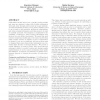Free Online Productivity Tools
i2Speak
i2Symbol
i2OCR
iTex2Img
iWeb2Print
iWeb2Shot
i2Type
iPdf2Split
iPdf2Merge
i2Bopomofo
i2Arabic
i2Style
i2Image
i2PDF
iLatex2Rtf
Sci2ools
CCS
2010
ACM
2010
ACM
Protecting location privacy against inference attacks
GPS-enabled mobile devices are a quickly growing market and users are starting to share their location information with each other through services such as Google Latitude. Location information, however, is very privacy-sensitive, since it can be used to infer activities, preferences, relationships, and other personal information, and thus access to it must be carefully protected. The situation is complicated by the possibility of inferring a users’ location information from previous (or even future) movements. We argue that such inference means that traditional access control models that make a binary decision on whether a piece of information is released or not are not sufficient, and new policies must be designed that ensure that private information is not revealed either directly or through inference. We provide a formal definition of location privacy that incorporates an adversary’s ability to predict location and discuss possible implementation of access control mechanisms ...
| Added | 13 Jan 2011 |
| Updated | 13 Jan 2011 |
| Type | Journal |
| Year | 2010 |
| Where | CCS |
| Authors | Kazuhiro Minami, Nikita Borisov |
Comments (0)

